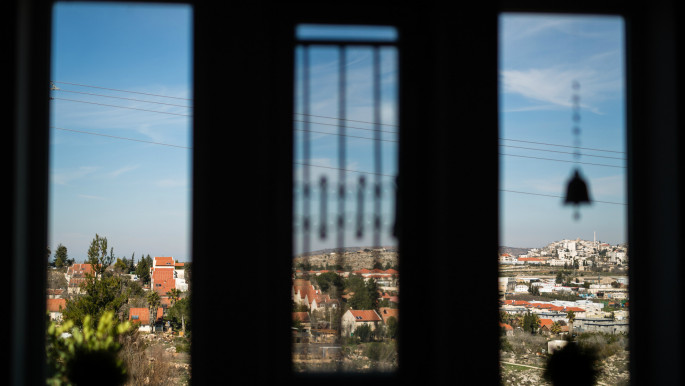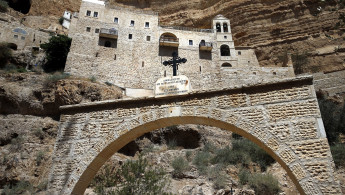Saint George still alive for dwindling Palestinian Christians
This year the day, a spiritually uplifting holiday for Palestinian Christians, coincided with the start of the sacred and poignant fasting month of Ramadan for Muslims. Especially on St George's Day, Christians turn their hearts toward the soldier-saint and mythical dragon slayer, who is believed to have been martyred for refusing to renounce his Christian faith. Even in a post post-modern age, they still ask his intercession with god for protection, health and just about any human need.
"I ask him for lots of things," said Maria Mirza, 77, holding a candle as she headed into the sanctuary with her grandchildren. "I ask for protection of the children, the sick people and the family." Mirza, who lives in Bethlehem, has been marking the day for fifty years.
Saint George's day is a centuries old tradition that is persisting despite the dwindling of the Christian population in the West Bank from lack of economic opportunities and the absence of hope for peace or an end to Israel's 52-year old occupation. Only about one percent of the West Bank's Palestinian population is Christian after many Christians emigrated in recent years and joined relatives in Chile, the US, Europe and Australia.
 |
Only about 1% of the West Bank's Palestinian population is Christian after many Christians emigrated in recent years and joined relatives in Chile, the US, Europe and Australia |  |
About 3,000 of the 47,000 Christians in the West Bank came to St George's church on Monday, the believed anniversary of the saint's beheading upon orders of the emperor Diocletian, according to Waleed Kaissieh, a shop owner who volunteers every year to greet the faithful.
Kaissieh loves the saint and believes he is still performing miracles, including curing his daughter Marie, 13, when she suffered from what he thought was a neurological disease seven years ago. Marie recovered after a hospital doctor discontinued harmful medications but Kaissieh thinks his appeals to god, the Virgin Mary and St George made the difference.
"Of course it was god. Sometimes god tests us to see if we have faith in him or not. God responds. Of course St George is part of it but it is God's response," Kaissieh said, adding that he beseeches the saint, "If I have a sick family member or friend, financial problems or need to decide whether to do a project or not."
According to local lore, the saint can also provide abundant harvests, make barren women pregnant and cure the mentally ill. Iron chains inside the church, reputed to have been placed on St George when he was tortured, bring a blessing to those who adorn them and kiss them three times, according to local belief.
Many Palestinian Christian homes have an engraving over their doorway of St George slaying the dragon – a metaphor for the triumph of good over evil and sin. This is believed to provide protection to those entering the house.
 |
Many Palestinian Christian homes have an engraving over their doorway of St George slaying the dragon – a metaphor for the triumph of good over evil and sin. This is believed to provide protection to those entering the house |  |
"St George prays for me to have peace and protects my family," said Habib Morra, 44, a businessman whose one year old son, Fuad, was wrapped in a red cape associated with the saint. Outside the church, he said he had just prayed to St George.
"When you ask St George, he comes immediately. He helps always. He always prays for this area and makes a lot of miracles."
Morra remembers coming to the celebrations as a thirteen-year-old with his mother. There were more people back then and after mass they would have barbecues in nearby gardens, he said.
 |
|
| Read also: Airbnb withdrawal from illegal Israeli settlements met with both fury and delight |
There also used to be a procession in which Christians from Bethlehem, Beit Jala and Beit Sahour would march to the church. Despite the declining number of Christians, "it continues to be an important holiday for believers," Morra said.
St George has significance for Muslims too as many scholars suggest that he is associated with the figure of al-Khader (literally the Green One), who is mentioned in the Quran as an associate of Moses.
Some Muslims used to bathe their babies at the church to elicit al-Khader's blessing, albeit without a baptism ceremony. Farmers would make vows and slaughter sheep behind the church, hoping for a good harvest.
Indeed, to Hazem al-Azza, owner of a café in nearby Beit Sahour who describes himself as a Sufi, or Islamic mystic, St George resonates as a "soul brother."
"Last year I went to al-Khader because I needed him," al-Azza said. "I did the ceremony with the chain and then I felt like he is welcoming me. The window started moving and there was wind and rain. I sat outside meditating and I felt him in that place. He welcomed me.
"Religion is just a beginning point for a Sufi. It's not the issue. The journey is the issue," al-Azza explained. "This culture and St George belong to everyone."
Ben Lynfield is a journalist currently based in Jerusalem.



